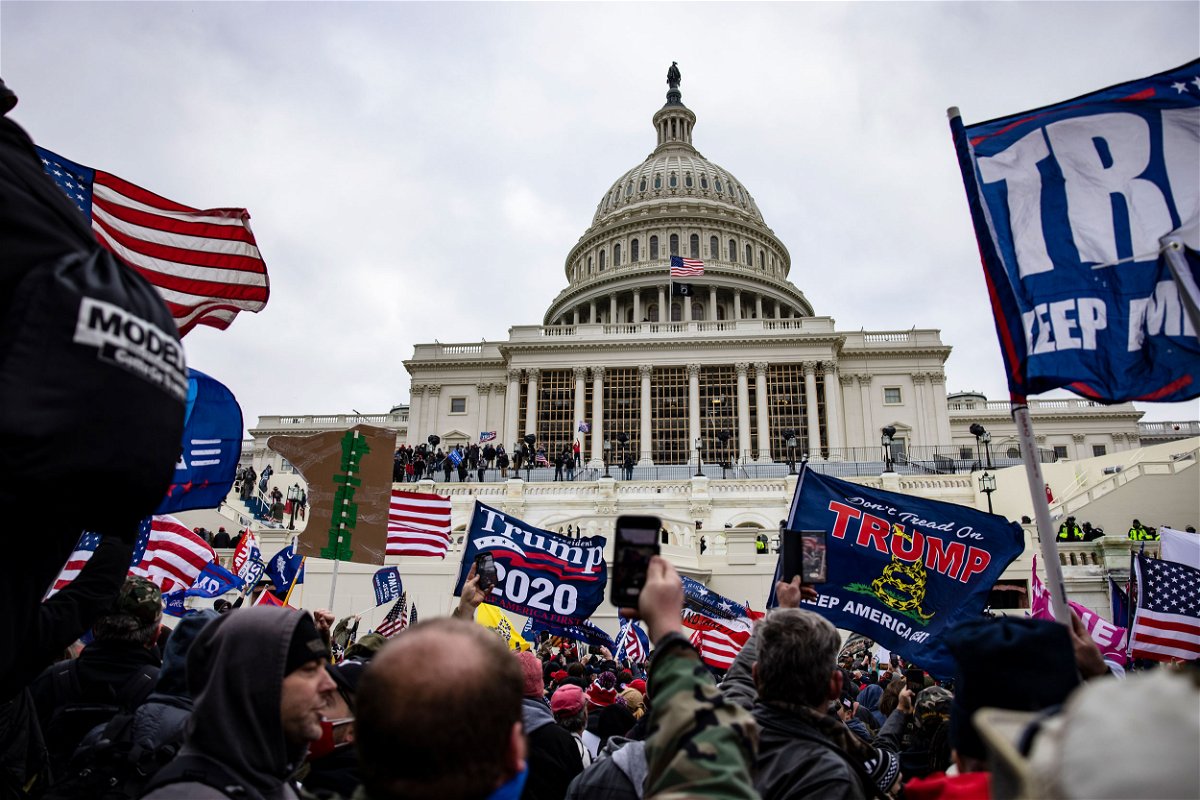Federal appeals court upholds Justice Department’s use of key obstruction law in January 6 cases

The federal appeals court in Washington
By Katelyn Polantz and Hannah Rabinowitz, CNN
The federal appeals court in Washington, DC, has upheld the Justice Department’s use of a key criminal charge against hundreds of January 6 rioters, saying they can be charged with obstructing Congress.
The appeals court said obstruction can include a “wide range of conduct” when a defendant has a corrupt intent and is targeting an official proceeding, such as the congressional certification of the presidential election on January 6, 2021.
The major ruling affects more than 300 criminal cases brought in the wake of the Capitol riot. The Justice Department has used the charge — obstructing on official proceeding — as the cornerstone of many of the more serious Capitol riot cases, where defendants were outspoken about their desire to stop Congress’ certification of President Joe Biden’s Electoral College win or were instrumental in the physical breach of the Capitol building.
In the cases that prompted the appeal, the defendants had allegedly assaulted law enforcement at the Capitol, which overwhelmed the protection around members of Congress in the building and caused the Electoral College certification to stop for hours.
The statute makes it a felony to alter, destroy or mutilate a record, document or other object with the intent of making it unavailable in an official proceeding, or to “otherwise” obstruct, influence, or impede any official proceeding.
The ruling has been hotly anticipated in the January 6 investigation, and a loss for the Justice Department would have imperiled hundreds of cases against individual rioters.
But the three judges on the panel weren’t united in their interpretation of the law, with each writing separately about how the obstruction statute should be interpreted.
“The broad interpretation of the statute — encompassing all forms of obstructive acts — is unambiguous and natural,” Judge Florence Pan of the US Court of Appeals for the District of Columbia Circuit wrote Friday in the 2-1 majority opinion.
The holding from Pan also lays out how prosecutors may use the obstruction charge, which carries a 20-year maximum prison sentence, when weighing defendants’ actions on January 6.
The circuit court’s opinion — which is now binding precedent in DC federal courts, unless additional appeals change the ruling — could potentially be used against future defendants in January 6-related cases, including ones being looked at by special counsel Jack Smith’s office, which is investigating former President Donald Trump and his allies.
Yet their opinions on Friday left unsettled a key question on how the Justice Department could use the charge against others with potentially less clear corrupt actions.
Pan’s majority opinion didn’t decide how the courts should define corrupt action taken by rioters — potentially putting limits around how the Justice Department could use the charge in the future.
Pan and Walker split on whether the definition of “corruptly” would mean that prosecutors would have to prove a defendants’ actions were to benefit themselves or others people, if they charge obstruction related to January 6.
That question could arise again in future appeals, and the judges weren’t clear which interpretation may be the controlling law now in DC.
“Because the task of defining ‘corruptly’ is not before us and I am satisfied that the government has alleged conduct by appellees sufficient to meet that element, I leave the exact contours of ‘corrupt’ intent for another day,” Pan wrote. She noted that the rioter cases that prompted the appeal left no room for disputing corrupt intent, seeing as the defendants were alleged to have assaulted police.
In his concurring opinion, Circuit Court Judge Justin Walker took a narrower approach to the obstruction law, finding that it requires a defendant to act “with an intent to procure an unlawful benefit either for himself or for some other person.”
Even so, Walker found that the obstruction law that the DOJ has charged rioters with applies in this case.
“True, the Defendants were allegedly trying to secure the presidency for Donald Trump, not for themselves or their close associates,” Walker wrote. “But the beneficiary of an unlawful benefit need not be the defendant or his friends. Few would doubt that a defendant could be convicted of corruptly bribing a presidential elector if he paid the elector to cast a vote in favor of a preferred candidate — even if the defendant had never met the candidate and was not associated with him.”
DC Circuit Judge Greg Katsas disagreed with his colleagues in the 2-1 decision. Katsas sided with a lower-court judge, who had thrown out obstruction charges against some January 6 rioters because the actions during the insurrection didn’t deal specifically with the mutilation of documents or evidence in an official proceeding.
Katsas argued that his colleagues’ interpretation of the obstruction law was too broad and would allow for aggressive criminal prosecutions any time a protester knew they may be breaking the law. He contended that the law requires that a defendant was trying to “seek an unlawful financial, professional, or exculpatory advantage” while the January 6 cases in question involve “the much more diffuse, intangible benefit of having a preferred candidate remain President.”
Walker, however, wrote in his opinion that that law applied even under Katsas’ reading.
“The dissenting opinion says a defendant can act ‘corruptly’ only if the benefit he intends to procure is a ‘financial, professional, or exculpatory advantage.’ I am not so sure,” Walker wrote. “Besides, this case may involve a professional benefit. The Defendants’ conduct may have been an attempt to help Donald Trump unlawfully secure a professional advantage — the presidency.”
This story has been updated with additional information.
The-CNN-Wire
™ & © 2023 Cable News Network, Inc., a Warner Bros. Discovery Company. All rights reserved.